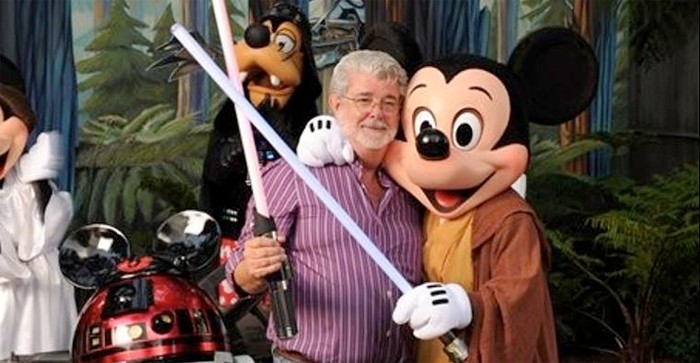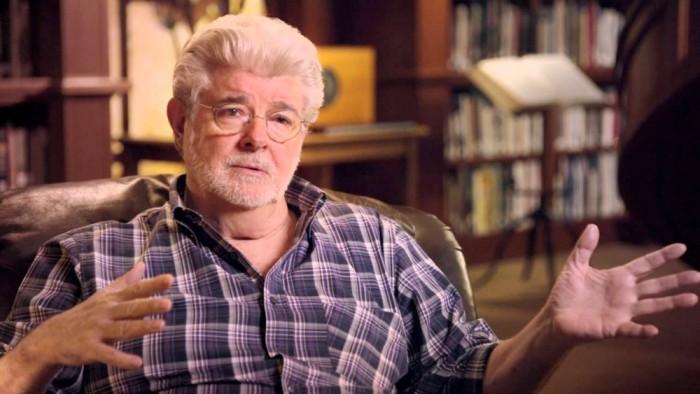George Lucas Is Too Popular To Get An Oscar, Didn't Want New 'Star Wars' To Be A "Retro Movie"
Before the release of Star Wars: The Force Awakens, franchise creator George Lucas had spoken a bit about giving up the reins to the sci-fi saga, equating the situation to a break-up. Disney didn't want to make the kind of movie that Lucas had in mind, and so the studio and the man went their own separate ways. And now we get even more from the filmmaker about what he didn't want for Star Wars, why he doesn't have an Oscar, and what he's going to do next.
George Lucas sat down with Charlie Rose for a nearly one-hour interview that covered everything from his career as a director and technological innovator, and he was pretty candid about Hollywood, making popular films and more. You can watch the full interview just below, but if you don't have 54 minutes to spare, we break down some of the finer points of his commentary after that. Here's the full George Lucas Charlie Rose interview from Hulu:
Starting things off with a bang, Rose made the mistake of thinking that Lucas had an Oscar already. Lucas clarified that he hadn't won any Oscars, adding, "They don't give Academy Awards to popular films."
Indeed, Star Wars didn't win Best Picture, but it landed Oscars for art direction, costume design, sound, film editing, visual effects, and score, not to mention nominations for Lucas for directing and writing. After that, the sequels never got that level of awards recognition again, and the prequels were far from awards-worthy. But that wasn't simply because the films were popular.
While I understand what Lucas is getting at with that kind of comment, one can't help but point out that some pretty popular films, such as The Departed, Argo, Slumdog Millionaire, Gladiator and Lord of the Rings: Return of the King, have won Best Picture in recent years. But forgetting about that detail, Lucas says he doesn't care about awards anyway and is fine with making popular movies:
Popular is okay with me. I think it's a very important part of society. If you're making a work of art or a film or whatever and nobody sees it, it does nobody any good.
However, in a bit of a contradiction, it seems that he's had it with being popular, because for the rest of his career, he doesn't want to make those kind of movies:
I'm gonna make movies that only I wanna see and I wanna do. I've always wanted to do that. I fell into popular movies by accident. I always disliked Hollywood theatrical movies. I didn't want anything to do with them.
And part of the reason that he ended up not making Star Wars: Episode VII with Disney is because he didn't want to make the movie that Disney wanted to make. We've already written about how Lucas said that Disney wanted to make something for the fans. And now we know that when he said that he thought fans would like The Force Awakens, it was a bit of a backhanded compliment. But now we get a little more from that train of thought, including one very poor analogy, and what could be a slight dig at The Force Awakens in retrospect.
First of all, when talking about the deal with Disney to sell Lucasfilm, the director refers to the Star Wars films as being like his kids, as many artists feel about their work. But then he equates the Disney deal to selling them "to the white slavers that takes these things, and..." He smartly laughs and moves on from that dangerous train of thought, and he has since apologized in a public statement. We get what he was trying to say, but c'mon, George. Anyway, he later adds what Disney wanted to do with Star Wars and vaguely talks about how it was different from his ideas:
They wanted to do a retro movie. I don't like that. Every movie I work very hard to make them completely different, with different planets, with different spaceships, make it new.
Knowing what we know now about The Force Awakens, it's hard to argue with him calling it a "retro movie." The film reuses plenty of elements (another Death Star-esque assault), settings (Jakku is just Tatooine), characters (just pick one), and more in what is essentially a remix of the original Star Wars with some bits of Empire Strikes Back and Return of the Jedi thrown in for good measure. There wasn't much new beyond the fantastic new characters, which are the biggest reason to be excited for Episode VIII.
Don't get me wrong, The Force Awakens is one of the most enjoyable experiences I've had at the movies in forever, and it's a good place to start a new trilogy. It's familiar enough to please fans hurt by the prequels, but has enough promising new pieces to pave the way for Episode VIII. But it's safe, lacking true originality and is certainly "retro" as Lucas says. So it's hard to slight George Lucas for avoiding doing what he already did back in 1977.
This is where we get into some rather insightful commentary by the director about what it's like working in the studio system as a filmmaker, making it clear as to why he doesn't want to do what the studios want him to do anymore. Thinking back to the times when the Soviet Union was a more prominent threat and headline-maker, Lucas said that when he was prompted to express his pleasure at being in America where they had all the freedom in the world, he responded:
I know a lot of Russian filmmakers. They have a lot more freedom than I have. All they have to do is be careful about criticizing the government. Otherwise they can do anything they want.
And when it comes to the Hollywood system, both back then and today, Lucas says, "You have to adhere to a very narrow line of commercialism." And to show how dangerous that can be, with studios just wanting sequels, remakes and more, he reminds us:
You gotta remember, 'Star Wars' came from nowhere. 'American Graffiti' came from nowhere. There was nothing like it. Now, if you do anything that's not a sequel or not a TV series or doesn't look like one, they won't do it!
Indeed, the greatest movies in the world came from a place of originality before they were turned into popular franchises. And now studios are obsessed with just reworking what they know already can sell. It's lazy, and while sometimes it does work, it's hard for creativity to thrive.
So for the next phase of his career, Lucas plans to go back to his American Graffiti and THX 1138 roots and play with the filmmaking as best he can: "I've been fascinated with the true nature of the medium — it's been used more as a recording medium, than as an art form unto itself." Speaking about tone poems in Russia, Lucas says he hopes to look at how to "tell visual stories, basically without dialogue, without all the things you use to tell a story, and you just use the film itself. It's kind of esoteric, it hasn't come much further in one hundred years. I'm going to try and take it into something that is more emotionally powerful than most of the stuff we've done up to this point."
Personally, I'm very interested to see what George Lucas can do outside of Star Wars at this phase in his career, and it would be great to see the ambitious filmmaker who wowed us so many years ago make some kind of comeback.


